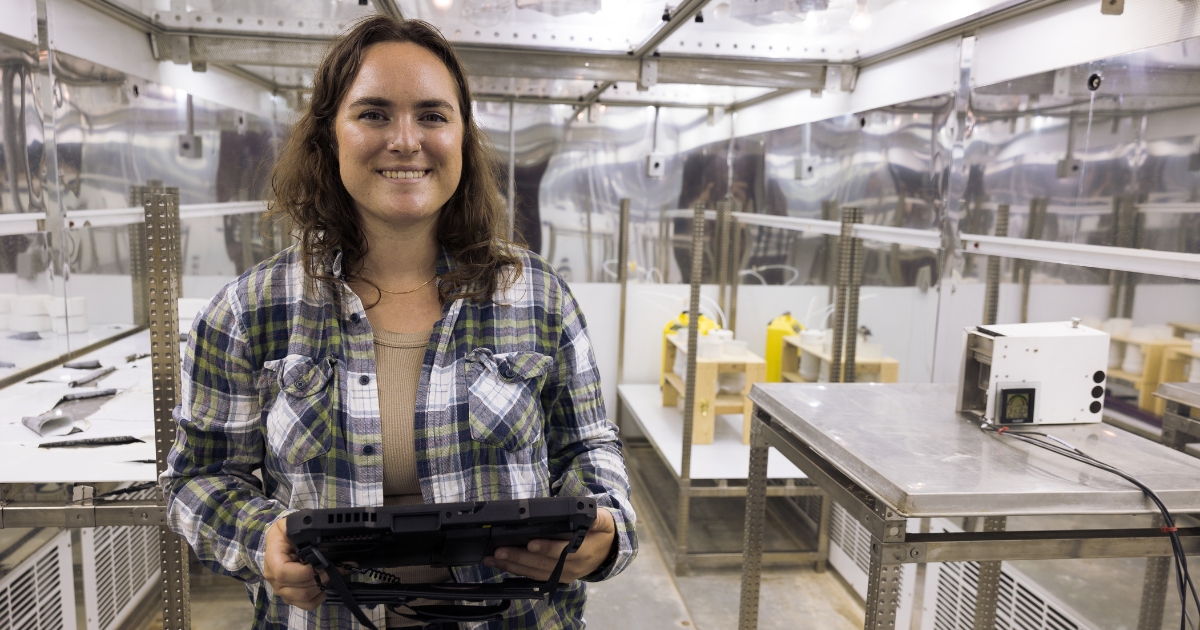Climate Solutions Woven into Fabric of Trent University
October 31, 2024

Trent uniquely poised to be world leader for the most pressing issue of our time
Whether it’s groundbreaking scientific research, a focus on the arts, sustainable agriculture research at the Trent Farm, certified sustainable buildings, or a collaborative interdisciplinary approach to understanding the intricate systems affecting the earth’s climate, Trent University is leading the way in new ways of thinking to find climate solutions.
“Climate solutions are part of the fabric of Trent University and are woven into everything we do and everything we teach,” said Dr. Stephen Hill, director of the School of the Environment. “We train students to be thoughtful, creative, and solutions-oriented so they can truly make a difference to tackle the world’s most pressing issue.”
One of the top ways that Trent is finding solutions is through groundbreaking scientific research into carbon sinks by School of Environment professor and Canadian Research Chair Dr. Ian Power. This research harnesses the potential of wollastonite by applying the rock powder to forests and agricultural fields to understand its potential to remove carbon dioxide from the atmosphere.
Researchers such as Professor Power can carry out their research at the Trent Farm, where climate solutions are being researched and taught through the lens of Trent’s sustainable agriculture and food systems. Thanks to recent philanthropic support for a new well, drive shed, and climate station, the Farm is positioned to grow Trent’s teaching and research around soil health and carbon.
The arts are also used by Trent faculty also support climate solutions. Dr. Neil Ever Osborne, for example, is an assistant professor in the School of the Environment and a renowned photographer who provides stunning images of nature to publications such as Smithsonian Magazine and National Geographic. Through the power of photography, the images tell important stories about the need to act on climate change. To bridge the gap between storytelling and climate change science, Prof. Osborne also created Trent’s Climate Communication Option at Trent Durham GTA that blends courses across disciplines to teach communication and activism strategy and tactics.
Trent also proudly features three certified sustainable buildings on campus. The Forensics Crime Scene Facility is the first in Canada to achieve certification through the International Living Future Institute's Zero Carbon program. In addition, the campus offers two LEED-certified buildings: the LHS, earning LEED Gold certification, and an extension of Trent’s Athletics Facility, certified LEED Silver. These achievements reflect Trent’s commitment to environmental sustainability and innovation in building design.
As with all areas of Trent, climate solutions at the University are firmly rooted in an environment that respects and recognizes Indigenous ways of knowing and doing as a valid means by which to understand the world. Working towards a net-zero future, Trent also ensures climate solutions are part of every area of the University including collaboration with local communities and industry partners.
Trent is uniquely poised to be a world leader in climate change, says Professor Hill, thanks in part to the University motto Nunc cognosco ex parte ‘Now I know in part.’
“This humility is central to Trent’s approach because climate change is a complex, overarching challenge that’s not easily solved. We must approach it from the view that we don’t yet have all the answers - we need to learn from different voices and different perspectives,” adds Prof. Hill. “Trent is training the next generation of environmental leaders who are thoughtful and reflective problem solvers, but at the same time work toward equity, social justice, and reconciliation. I find that very inspiring.”
Learn more about supporting Trent University to find climate solutions.